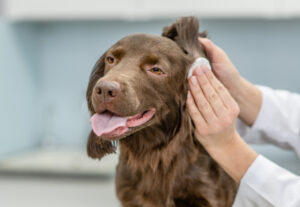
Understanding and Managing Ear Problems in Dogs
Ear problems in dogs are common and can arise from a variety of causes, such as infections, allergies, or parasites. By learning to recognise the symptoms and understanding the underlying causes, you can take steps to ensure your dog receives the best care.
Symptoms of Ear Problems in Dogs
Keep an eye out for these common signs of ear trouble:
- Frequent scratching or pawing at the ears
- Shaking or tilting of the head
- Redness, swelling, or discharge in the ear
- Unpleasant odours coming from the ears
- Sensitivity or pain when touched
- Hearing loss or lack of responsiveness to sound
- Difficulty maintaining balance
Common Ear Issues in Dogs and Their Treatments
1. Otitis Externa
This is an inflammation or infection of the outer ear canal, often caused by bacteria, yeast, or mites. Treatment may include:
- Cleaning the ear
- Administering topical or oral medications
- Addressing underlying issues
2. Ear Mites
These tiny parasites cause intense itching, redness, and discharge. Treatment involves:
- Anti-parasitic ear drops or ointments
- Cleaning the ears to remove debris
3. Ear Infections
Bacterial or fungal infections can lead to pain, swelling, and discharge. Treatment typically includes:
- Cleaning the ears
- Using antibiotics or antifungal medications
- Resolving any underlying health problems
4. Allergies
Food or environmental allergies can trigger ear inflammation and infection. Managing allergies may require:
- Identifying and avoiding allergens
- Administering anti-inflammatory or antihistamine medications
5. Deafness
Hearing loss can result from aging, genetic factors, or recurring ear infections. Treatment depends on the cause and may include:
- Managing contributing factors
- Adopting alternative communication methods, such as hand signals
How to Prevent Ear Problems in Dogs
Preventative care is crucial for maintaining your dog’s ear health. Follow these tips:
- Regular Veterinary Check-ups: Schedule routine visits to monitor your dog’s overall health and catch ear problems early.
- Ear Cleaning: Clean your dog’s ears regularly using a vet-approved solution. Avoid inserting anything into the ear canal.
- Proper Grooming: Trim hair around your dog’s ears to reduce irritation and prevent infection.
- Allergen Avoidance: Identify potential environmental or food allergens and take steps to minimize your dog’s exposure.
Protect Your Dog’s Ear Health
By staying vigilant and addressing symptoms early, you can help protect your dog from discomfort and long-term complications. Combine regular check-ups, proper grooming, and a clean environment to keep your dog’s ears healthy and their overall well-being intact.

